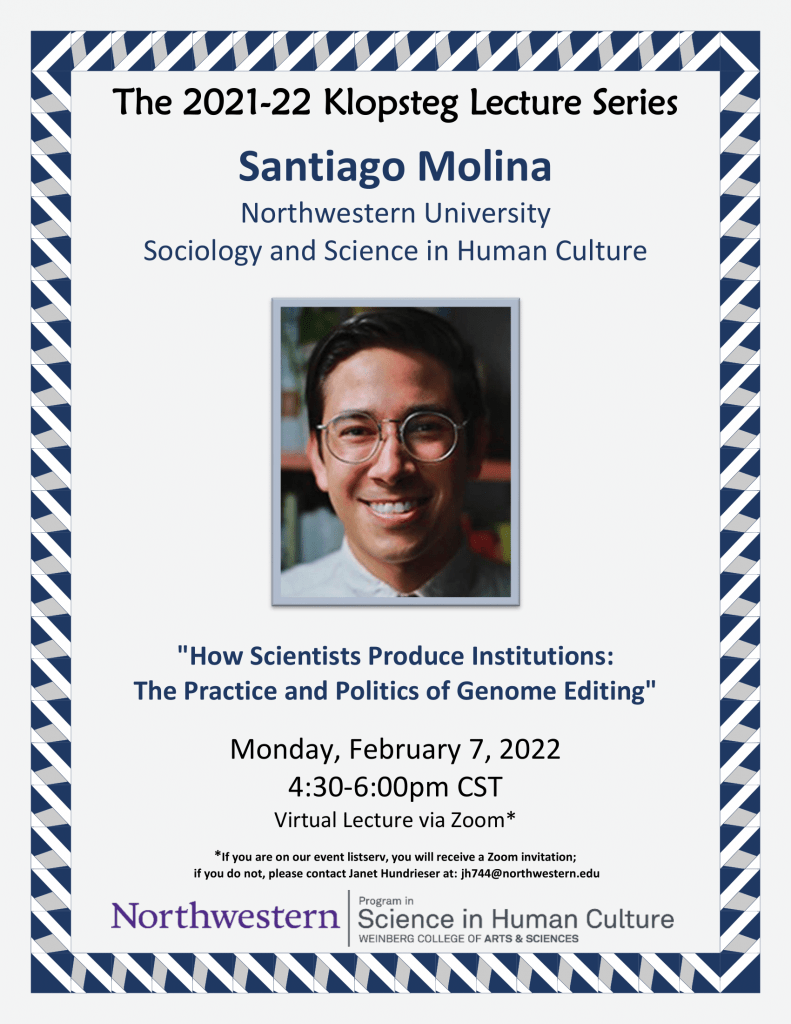
Abstract
The CRISPR-Cas9 system has been heralded by researchers as a breakthrough biotechnology and has gained widespread use in biomedicine. Despite the over 20 clinical trials for treating genetic diseases with genome-editing technologies underway, the moral basis of modifying human DNA is still debated by scientists, regulators, and patients. This talk reframes concerns over the ethics of genome editing as a problem of institutionalization: How is the idea and discourse of genome editing rendered into a durable set of practices that become routine, legitimated and, ultimately, taken for granted? Methodologically, I draw from participant observation, in-depth interviews, and archival research to trace the organizational, moral, and discursive dimensions of institutionalization. I argue that scientists shape the institutionalization of genome editing by resisting the encroachment of regulatory bodies and carefully maintaining the boundaries of self-governance.
Biography
Santiago J. Molina (he/they) grew up moving between the United States and central Mexico. He received his PhD in Sociology from the University of California, Berkeley and his BA from the University of Chicago. Their work sits at the intersections of science and technology studies, political sociology, sociology of racial and ethnic relations, and bioethics. On a theoretical level, Santiago’s work concerns the deeply entangled relationship between the production of knowledge and the production of social order. They are pursuing this line of research through two projects:
The first project, The Biopolitics of Genome Editing, analyzes the institutionalization of CRISPR-Cas technology. Through participant observation, interviews, and archival methods this NSF-funded project seeks to detail how scientists adopt CRISPR into their work and to explain how, when and under what conditions scientists articulate standards of practice that shape what counts as ethical genome editing. Since 2015, Santiago has followed the trajectory of genome editing practices as they travel from the lab bench to the clinic. During his time at Northwestern, Santiago will extend this project to research the racial politics of recruiting patients into genome editing clinical trials for sickle-cell anemia and beta thalassemia.
The second project, Categorical Heterogeneity in Population Genetics and Biomedicine, is concerned with sampling practices and conventions of classification in human biology from the mid-Twentieth Century to the present. This project traces the impact of ‘populationist’ views of human difference on the categorical work of physical anthropologists, genetic epidemiologists and physiologists. In collaboration with The Edmond J. Safra Center for Ethics at Harvard University, Santiago is researching how scientists in different disciplines conceptualize and operationalize human difference through “ancestry” and “population.”
Santiago’s teaching has aimed to cultivate practical tools for thinking critically about the relationship between science and society. They have taught courses on sociological methods, intro to sociology, science and technology studies, and the sociology of illness.
Link to Join Zoom Meeting: https://northwestern.zoom.us/j/91807275876
Meeting ID: 918 0727 5876